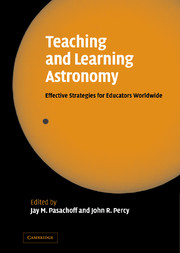Book contents
- Frontmatter
- Contents
- List of illustrations
- Preface
- Introduction
- Part I Astronomy in the curriculum around the world
- Part II Astronomy education research
- Part III Educating students
- Introduction
- 8 Textbooks for K–12 astronomy
- 9 Distance/Internet astronomy education
- Open discussion
- Poster highlights
- Part IV Educating teachers
- Part V Astronomy and pseudoscience
- Part VI Astronomy and culture
- Part VII Astronomy in developing countries
- Part VIII Public outreach in astronomy
- Part IX The education programs of the International Astronomical Union
- Part X Conclusions
- Author index
- Subject index
Poster highlights
Published online by Cambridge University Press: 18 May 2010
- Frontmatter
- Contents
- List of illustrations
- Preface
- Introduction
- Part I Astronomy in the curriculum around the world
- Part II Astronomy education research
- Part III Educating students
- Introduction
- 8 Textbooks for K–12 astronomy
- 9 Distance/Internet astronomy education
- Open discussion
- Poster highlights
- Part IV Educating teachers
- Part V Astronomy and pseudoscience
- Part VI Astronomy and culture
- Part VII Astronomy in developing countries
- Part VIII Public outreach in astronomy
- Part IX The education programs of the International Astronomical Union
- Part X Conclusions
- Author index
- Subject index
Summary
Some of the varied astronomy teaching methods are examined here, starting with Paul J. Francis's paper, Using games to teach astronomy.
I have been experimenting with using role-playing games to teach introductory university astronomy. The idea is this: rather than simply telling students about some topic (e.g., the climate of Venus), I tell the class to “imagine that you are world experts on Venus, gathered together here at great expense to solve the baffling mystery – why is Venus so much hotter than the Earth?” The class is divided into small groups, and each group is given a briefing paper. A group, for example, might be experts on infrared radiation, or atmospheric transparency, with their briefing paper giving them a set of clues on this topic (along with lots of red herrings – to teach students the art of extracting meaningful information from noise).
No single briefing paper contains enough information to solve the puzzle – students have to wander around the room, exchanging clues, and slowly putting together a plausible theory, which they then present to the rest of the class.
How does it work? Fabulously well, in general. It really gets students thinking, and interacting with each other. It permanently changes the whole classroom dynamic. At first there was concern that studentswould go berserk (and a security guard once tried to close down one of these lectures, thinking it was a riot in progress), but even poorly motivated high-school students seem to find these exercises interesting enough to keep their attention.
- Type
- Chapter
- Information
- Teaching and Learning AstronomyEffective Strategies for Educators Worldwide, pp. 119 - 134Publisher: Cambridge University PressPrint publication year: 2005



